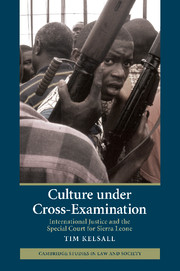Book contents
- Frontmatter
- Contents
- List of illustrations
- Preface
- 1 White man's justice? Sierra Leone and the expanding project of international law
- 2 The story of the CDF trial
- 3 An unconventional army: chains of command in a patrimonial society
- 4 Facts, metaphysics and mysticism: magical powers and the law
- 5 We cannot accept any cultural consideration: the child soldiers charge
- 6 ‘He's not very forthright’: finding the facts in a culture of secrecy
- 7 Cultural issues in the RUF, AFRC and Charles Taylor trials
- 8 Conclusion: from legal imperialism to dialogics
- References
- Index
8 - Conclusion: from legal imperialism to dialogics
Published online by Cambridge University Press: 18 January 2010
- Frontmatter
- Contents
- List of illustrations
- Preface
- 1 White man's justice? Sierra Leone and the expanding project of international law
- 2 The story of the CDF trial
- 3 An unconventional army: chains of command in a patrimonial society
- 4 Facts, metaphysics and mysticism: magical powers and the law
- 5 We cannot accept any cultural consideration: the child soldiers charge
- 6 ‘He's not very forthright’: finding the facts in a culture of secrecy
- 7 Cultural issues in the RUF, AFRC and Charles Taylor trials
- 8 Conclusion: from legal imperialism to dialogics
- References
- Index
Summary
I wrote in the preface to this book that the Special Court was rather like a Mercedes Benz, crawling at a pitiful pace along Sierra Leone's potholed roads: prestigious, maybe, but ill-adapted to the local terrain. Pushing the analogy further, we could be forgiven for thinking that in the case of the CDF, it was so ill-suited that one of the defendants was taken to the wrong place, while another got locked in the vehicle through little fault of his own. In the subsequent chapters, I have tried to show that this was because the legal doctrine of superior responsibility was unsuited to the realities of Sierra Leonean social and military organisation; I have argued that Western legal precepts and procedures were unsuited to judging adequately the actions of a man whose power stemmed from occult beliefs; I have suggested that crimes such as forced marriage and enlisting children for military service were inappropriate to the Sierra Leonean cultural context; and I have pointed to a range of difficulties that the encounter of two unfamiliar cultures created for the task of assessing witness credibility. In this, the book's conclusion, I suggest some ways in which this situation might be repaired. I will begin by discussing some practical reforms, then some ethical issues, then some epistemological quandaries, before finally advocating a more pluralistic justice approach.
PRACTICAL REFORMS
I argued in Chapter 6 that the quality of evidence elicited at the Special Court was generally poor. This was for a variety of reasons.
- Type
- Chapter
- Information
- Culture under Cross-ExaminationInternational Justice and the Special Court for Sierra Leone, pp. 256 - 267Publisher: Cambridge University PressPrint publication year: 2009



